Children of a wiser day
Rise like Lions after slumber
In unvanquishable number,
Shake your chains to earth like dew
Which in sleep had fallen on you-
Ye are many, they are few.
Shelley.
“Only one thing could have stopped our movement – if our adversaries had understood its principle and from the first day had smashed with the utmost brutality the nucleus of our new movement.” – Hitler
I saw the rise of the far-right Front as a dangerous and alarming omen for the future. The idea that any country should be purged of it’s ethnic minorities, It’s jews and homosexuals and an ideological revolution be imposed on the population by force was both evil and insidious. I saw the advance of such thuggery as not to go unchecked. They were a constant physical threat to our homes and to the families of the children I taught. In June 15, 1974, the word spread that they were to march through London’s West End finishing with a meeting in Conway Hall, Red Lion Square. They were to protest against the government’s amnesty for illegal immigrants with the slogan ‘Stop immigration—start repatriation’.
The London Area Council for Liberation announced that it would conduct a counter demonstration which consisting of a march through London ending with a public meeting at the same location. This would be to fight the Front’s anger, not to provoke it.
In their newspaper ‘The Flag’, the Front railed against those they labelled as ‘Communist parasites.’ I saw their campaign as a provocation that couldn’t go unanswered. To start with I had to challenge the understanding of fascism that prevents people from taking fascists seriously until they seize power. Very few really believe that there is any serious chance of a fascistic regime ever materializing in Britain.
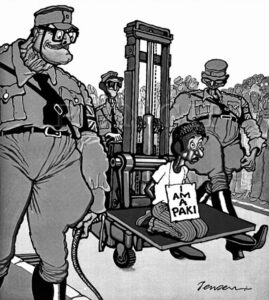
The way people understand fascism, or the way they’ve been taught about it, is generally exclusively in terms of regimes. So, the thought goes, as long as we have parliamentary government, we’re safe. But we can look back to the historical examples of Italy, Germany as well as Chile and Argentina to see that, unfortunately, parliamentary government was insufficient to prevent the rise of racism and fascism , and actually provided a red carpet to their advance.
So, because of that reason, people think of fascism in terms of all or nothing, regime or nothing. I go along with the argument that fascism must be nipped in the bud from the beginning, that any kind of organizing needs to be confronted and responded to.
After assembling on the Embankment, we hit the street under the wary eyes of a contingent of mounted, foot and motor traffic police. Shoulder to shoulder we marched in an orderly fashion, waving placards, singing out to onlookers along the way to join us.
‘They’re less likely to attack us now. There’s safety in numbers,’ I said to a fellow marcher as more joined us.
‘Tell that to the six million Jews,’ she replied.’
Our numbers having swollen, we reached the Square , without incident . Few people may realise how the land occupied by famous London squares such as this has been contested and even fought over. A communal oasis of peace and tranquility, a source of light, space and better air, this one is where Haydn lived and wrote his ‘Surprise Symphony’.
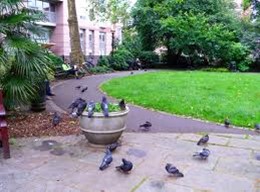
Like the others it has a turbulent history, encompassing natural disaster, crime and riots
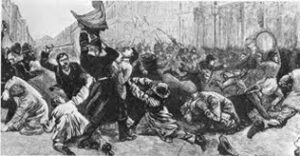
Red Lion Square is believed to be where Cromwell’s rotting corpse was buried after being dug up from Westminster Abbey, found guilty of conspiring to kill the King, strung up and beheaded. During the anti-Catholic Gordon Riots of 1780, it was a prime target since so many establishment figures lived in squares like this. Those marching then were opposed to the government eliminating a number of penalties and disabilities imposed on Roman Catholics. Some 12, 000 soldiers and crushers were drafted to restore order. They surrounded Red Lion with foot patrols.
We planned to hold an open air meeting there on the north side, away from the Hall. Here a contingent of police waiting squared away confronted us, jostling and hemming us in on all sides. You can see my position in the crowd from the following photos. I am wearing a white ski cap.
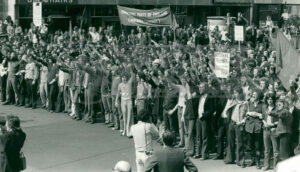
Suddenly we heard the Front approaching, accompanied by an Orange fife and drum band. They were proclaiming that they were also opposed to the government eliminating a number of penalties and disabilities imposed on Roman Catholics in the north of Ireland. According to one of them, they marched in paramilitary style, “like a Roman Legion, the scouts and runners ahead, the phalanx of flags fluttering above their heads, the drum corps, the membership marching in branch formations interspersed with squads of tough national stewards, ready for action’. Suits had been dug out of cupboards, shoes got polished as members dressed up for the day trying their best to look like respectable members of the public. Others with shaved heads and tattoos were in paramilitary fatigues and steel pointed Union Jack Doc Martens.
As they let go their massed chant :”The Reds… The Reds… we’ve got to get rid of the Reds!’ we began hooting at them, linking arms to defend our lines , readying ourselves in this potentially volatile situation. They didn’t diddle around revealing their surprise. ‘Allo, Allo”, I thought, “What’s all this then?” While police cordons closed in on our flanks, reinforcements behind us effectively prevented any escape.
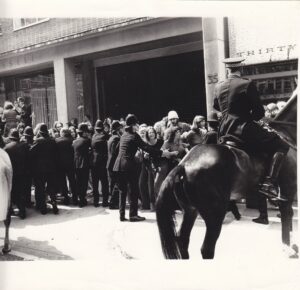
They launched their attack. Mounted police charged up, batons drawn, and waded straight into us without any shot across the bows.
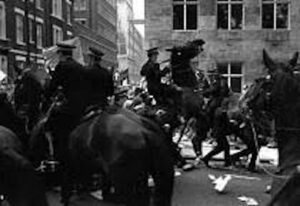
Supported by foot police pushing us back, they used truncheons on us indiscriminately. The scariest moment was when the police horses stood on their hind legs as a result of being frightened or injured. My sphincter tightening, the thought flashed through my mind ‘How can they get away with this?’ when suddenly it struck me as if it had come from above. Well waddya know, towering over me, this horseman brought his weapon crashing down on my forehead. They made a large number of arrests, leg- and- arming demonstrators to the awaiting coaches. Photos show that many who were arrested had their hair pulled or were otherwise treated with what appeared to be excessive force by police. Grabbed by the shoulder-blades, the wound to my head gushing blood profusely,
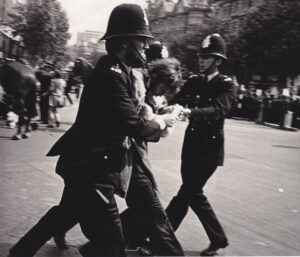
I was taken away from the melee, and put in a large coach to await others being taken in.
While this was happening the National Front were allowed to turn right into Southampton Row and escorted round the south side of Red Lion Square into Conway Hall.
There was widespread press and media coverage of the clash, officially termed ‘disorders’ in Red Lion Square. The opening image on the B. B. C. that evening was of the police tearing into me. It announced the sad death of Kevin Gately, a second year student of mathematics at the University of Warwick who had accompanied fellow students . He died as a result of blow to the head during police horse charges against us. Kevin was not a member of a political group and had never been on a demonstration before. Photos show Kevin standing out above the crowd because of his exceptional height.
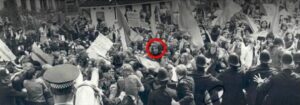
He was moving through the crush, possibly trying to escape from the tight press of bodies during the pushing at a police cordon. His unconscious body was found by police after the crowd was driven back.
It was taken in an ambulance to University College Hospital.
Kevin’s fellow students only realised that he was missing when they met after the demonstration ended. A student who enquired at University College Hospital was shown Kevin’s body and asked to identify him.
A coroner’s inquest at St Pancras Coroner’s Court concluded that Kevin’s death was the result of a blow to the head from a blunt instrument. Left wing newspapers at the time blamed his death on the mounted police. Others say this was based on supposition and that the weight of evidence forthcoming has not been conclusive.
Kevin was the first demonstrator to be killed in Britain for 55 years.
The clash was vigorously discussed by the peers in the House Of Lords, throwing further the nature of the state into sharp relief.
The Earl Of Arran: ‘My Lords, will Her Majesty’s Government please recognise that this is the first confrontation between Fascism and Communism in this country, and that it is likely to be repeated?’
‘Lord Nugent Of Guildford: ‘My Lords, is the noble Lord aware that on the B. B. C. television news last night the incident was presented as a clash between the police and the Liberation Movement? Is he aware that this presentation of the news completely omitted to show that basically this was a clash between the Liberation Movement and the National Front Movement which the police were trying to hold apart? Is he aware that, as the liberty and safety of everyone depends on the action of the police, the presentation by the B. B. C. was far below their normal high standards? Will he ask them to take more care in the presentation of a very important incident?’
Viscount Colville Of Culross, stressing his impartiality, asked: ‘were not the police there probably sacrificing some of their well-earned off-duty time in order to guarantee our much-cherished traditions of freedom of speech and freedom of association and to keep the peace?’
Lord Brockway, the Honorary President of Liberation: ‘It is fair to Liberation to say that I was not so much concerned that those associated with Liberation would engage in violence as with those who always attach themselves—and this is the danger—to such demonstrations; and that is in effect what took place. There was no conflict between those associated with Liberation and the police. The conflict was when those who sought confrontation with the police broke away from the procession and advanced towards the police.’
Lord Nugent Of Guildford: ‘My Lords, is the noble Lord aware that on the B. B. C. television news last night the incident was presented as a clash between the police and the Liberation Movement? Is he aware that this presentation of the news completely omitted to show that basically this was a clash between the Liberation Movement and the National Front Movement which the police were trying to hold apart? Is he aware that, as the liberty and safety of everyone depends on the action of the police, the presentation by the B. B. C. was far below their normal high standards? Will he ask them to take more care in the presentation of a very important incident?’
LORD LEATHERLAND
‘My Lords, when my noble friend comes to consider the relative responsibility of these two organisations, and when he comes to consider the statement of my noble friend Lord Brockway that there was no confrontation between Liberation and the National Front, will he bear in mind what many of us saw on the television last night—that a member of Liberation, with a baton in his hand, advanced towards a horse upon which was a mounted policeman, and he struck at that horse?’
Hot on the heels of the demo, we marched again silently, retracing the route of the first from the embankment to Red Lion Square. The march on the following Saturday was led by Kevin’s personal friends , followed by University of Warwick students and then by students from many other universities and colleges as well as contingents from many of the groups that had taken part in the original march.
My arrest was the leading item on B. B. C. television that night. You’d expect the footage would have given Exhibit A, incontrovertible evidence as to the illegality of the police tactics. Think again. The powers that be placed a ban on such footage being released for legal purposes. Not that that impressed the magistrate who threw out the police charge against me without much deliberation. Regretting that “greater discretion was not shown by some younger policemen in the use of the baton, the magistrate rejected their case. Speaking against the policy of ‘wherever you see a head hit it’, he called for greater restraint in future.
The Inquest into Kevin Gately’s death was followed by a public Inquiry headed by Lord Scarman which considered a wide purview of evidence from police and marchers. Called to give evidence, I was escorted along polished tiled floors, past imposing columns through heavy, intricately carved doors into the grand oak panelled world of stately corridors, stained glass windows , high ceiling chambers furnished with red velvet upholstered chairs, padded leather benches, crimson curtains braided with heavy gold braid, , arranged in mannered folds.
The ‘full majesty of the law’ in full panoply in leatherland.
From Sir With Love.
You’ve got to be taught
To hate and fear
You’ve got to be taught
From year to Year
It’s got to be drummed
in your dear little ear
You’ve got to be carefully taught
You’ve got to be taught
To be Afraid
Of people whose eyes
are oddly made
And people whose skin
Is a different shade
You’ve got to be carefully taught
You’ve got to be taught
Before it’s too late
Before you are 6 or 7 or 8
To hate all the people
your relatives hate
You’ve got to be carefully taught.
[South Pacific]
For a couple of weeks after the demo, my scar my badge of honour, I was looked up to as a protector by my students.
‘ Honor, big up,’ one declared in appreciation. ‘You’re a real gorgon!’
A working class hero is something to be. Even if only for that warholian fifteen minutes.
The kids insisted on discussions about racism and the Front.
‘Right you are, boys and girls, fire away,’ I declared.
As if from out of a tap, all their resentments about the prejudice towards them poured out. Including that towards teachers.
‘How can any white teacher teach us anything about racism?’ objected one boy from the start. ‘What could he possibly know about our circumstances? What would you call a black man who’s cutting open a body? ‘he asked, directing the question to me.’
‘I’m afraid I don’t know, ’I answered, taking care not to be tripped up by some juvenile joke.
‘A surgeon, you racist teacher, ’he answered. ‘What else would you call him.’
‘Just being black,’ said Delilah coming to my rescue, ‘doesn’t qualify you to understand the race situation any more than being sick makes you an expert on medicine. White is not a colour, white is an attitude. What some regard as being offensive can be seen by others as harmless, or as carrying things too far.
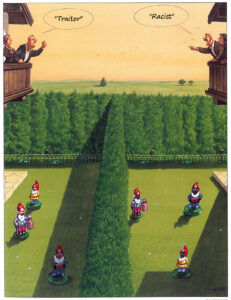
The world knows that race is only skin deep. Racism goes right to the bone.’
The main hurdle had been cleared.
‘ From the time we are born, we are branded, faced with hostility and all,’ said Delroy. ‘My mum held up my baby brother for a Tory candidate to kiss. He bit him.
Our people are often passed over for jobs. When our parents go following up any decent vacancies, they find they’ve disappeared-like magic. They ask if a job is open and as soon as the employer says ‘yes’, our folk say, ‘Can I come for an interview right now?’ That is to narrow the gap, because the minute you got there they say, ‘Oh, the job is gone.’”
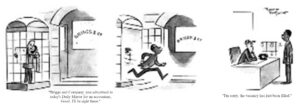
‘The minute they see you’re black, that’s it. We just take it for granted that it’s going to happen. That’s why applicants are asked to apply in person. Here and there we are gawped at and get a lot of attitude, like in shops, on buses and on the street. Some of them you can barely hear them sniggering, ‘niggering’, behind our backs. ‘Black bastards, ’they grumble.
‘If any of them take our side, they can be shunned by others, said Barrington. ‘One white woman went to the aid of my brother lying bleeding on the street during the white riot in ‘58. She helped bandage him. Her father went mad I’m told and wouldn’t talk to her for six months.’
‘So white families can be very divided about how to relate to you, I said.
This became apparent when my mates and I were seated in a near empty café waiting for our food. One of my skinhead neighbours and his hangers on approached us.
‘You’re from Ladbroke Grove, yeah?’
‘I know you’re from Ladbroke Grove cos I’ve seen you around.’
‘Yeah?’ I mean it’d be hard to miss you, wouldn’t it?’
‘Yeah, why’s that?’
‘Are you being funny?’
‘No. I just want to have a snack in peace.’
The skinhead then ordered us to change seats.
‘Go on. Move!’ He commanded.
‘Why should we ? There’s loads of seats free.’
‘Well, this is our table now. Or do we need to move you darkies?
‘Get up,’ he whistled as if we were back in the days of slavery. ‘Come on. Off you go .Quickly. Good boy. Thank you very much. Move.’
‘When we decided we didn’t want a rumpus or to be blamed as troublemakers we moved to seats nearby.’
‘Is that how you usually handle louts like that?’
‘I always try to walk away from a row. Especially with a racist. But sometimes you can’t though. And you just can’t walk away even if you want to, so I’ll try talking to them and keep it calm and sensible. Nine times out of ten the guy you’re talking to isn’t like that at all. His life revolves around sneaking in a few beers, watching the footie and playing pinball machines. He knows he’s not going to win in a calm, meaningful debate and his only chance is to turn it into a fight. So he starts stoking himself, making himself angrier and angrier until he’s angry enough to throw one.’
‘So what happened with that skinhead ordering you about?’
‘He pushed it as far as he could: ‘Oi, oi, oi. No, no, no. Move over there, mate,’ he said, pointing to the farthest available seats. ‘All right? I can still bloody smell you from here, all right?’ he said while his mates cackled. ‘Go on, move. Quickly. Thank you.’
‘Yes, we do smell,’ Barrington said to him. ‘And do you know what your sisters call it when they smile and wink at us and cheer our football skills? The sweet smell of success.’
‘Are your football teams mixed and include boys like that, Delbert?’ I asked.
‘My football team is made up mainly of white boys with a few blacks,’ he replied. ‘However it only brings us so far into their world. At games the other boys cheer our star black scorer, and then when a black player on the other team gets the ball, they’ll they’ll slag him off and shout, ‘Kill that nigger! Kill that nigger!’ They yell this sitting right next to me, as though I’m not really not there.
One of these numbskulls chucked a banana at our star. How imaginative is that. A banana! This is the 20th Century, not the 17th. We’ve moved on since then. We like other things. He could at least have chucked a Mars bar.’
‘Come Mr. Tallyman, tally me a Mars Bar,’ sang one of the boys.
At football games troublemakers chant, taunt and shout obscenities at us on the way to the stadium and from the other end of the terrace.’
‘ “Here we go, here we go, here we go”, sang Delroy over and over again to the tune of Sousa’s “The Stars and Stripes Forever”.
‘You never walk alone when you attend a football game,’ said Winston. ‘They stalk us afterwards.
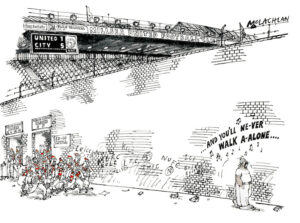
‘My mate and I were walking home through the park after one final when we noticed we were being followed by a pair of those hoodlums. ‘Winston,” said my friend, “we’d better get out of here. There are two of them, and we’re alone!”
‘That’s when another black boy appeared running behind us, buck naked. We joined him to run for our lives.’
‘Why did you do that?’
‘If you see a guy running cock-flapping, you run with that guy. ‘Cause there is some scary shit coming’
‘‘These trogs never accept us as being British,’ said Delroy. They cuss and cry, ‘Why don’t you go back where you came from? Don’t they realise we’ve asked ourselves the same question.’
‘When I say I’m from Ladbroke Grove,’ said Delilah, ‘they ask where are you really from? Our parents ask, ‘Are we citizens or merely visitors? When the sun is shining, we’re regarded as English. When things go badly in the nation, a football defeat or a messy labour strike, we’re not.’’
‘What about the police?’, I asked. ‘They are about providing you with protection as legally recognised subjects.’
’‘Are they what? They cover the white lads’ tails. If someone pesters us or is violent to us, they won’t come up with the wrongdoers.
‘I’d like to see them come down as heavily on these disorderly boys as they do to us.’
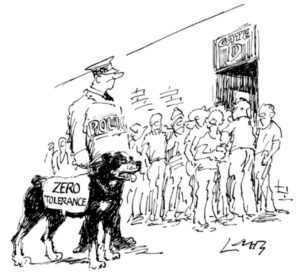 ”If we complain, they don’t take us seriously. They call us ‘Dot’, ‘Spot’, ‘Spook’, ‘Smut’, ‘Midnight’. Every black derogatory name you can ever think of. They look on us as crims in the making. They see crime as a black problem. I was born a suspect, stamped from the beginning, my only sin in my skin. I can walk down some streets in London and women will clutch their purses tighter, look anxiously around, lock their car doors. If I look up into the windows of the flats I pass I can see old ladies on the phone. They’ve already dialled 999 and are just waiting for me to do something wrong. The cops stop and shake us down whenever they like, especially if we’re jogging at night, especially if they don’t like the look of us. They take a dim view of our people when we protest.
”If we complain, they don’t take us seriously. They call us ‘Dot’, ‘Spot’, ‘Spook’, ‘Smut’, ‘Midnight’. Every black derogatory name you can ever think of. They look on us as crims in the making. They see crime as a black problem. I was born a suspect, stamped from the beginning, my only sin in my skin. I can walk down some streets in London and women will clutch their purses tighter, look anxiously around, lock their car doors. If I look up into the windows of the flats I pass I can see old ladies on the phone. They’ve already dialled 999 and are just waiting for me to do something wrong. The cops stop and shake us down whenever they like, especially if we’re jogging at night, especially if they don’t like the look of us. They take a dim view of our people when we protest.
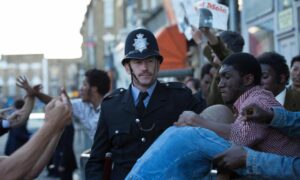
They gave my older brother the blue light special. They did him for driving over the speed limit.’
‘What do you think was the real reason for him being booked?’ I asked.
‘BWD. Black While Driving.’
‘Don’t plenty of poor white guys looking sus get checked out on the road too?
‘They do. My brother told me about one in particular. A drunk white guy who was driving along at night in the middle of Hampshire. In his stupor, he hit two West Indians. One of them went through the windshield, and the other bounced off the bumper and was sent flying down the road into a ditch. The police just happened to be behind him and the driver knew that he was on the hook. By the time the policeman got to him he was on the verge of tears.
After seeing how distraught the driver was he said, ‘Now now son, keep your hair on. We’re gonna make this right. We’re gonna charge this fellow here in your windshield with breaking and entering and that one in the ditch with denting your chassis and leaving the scene of the accident.’
‘If the police didn’t breathalyse him, what were they doing?’
‘They seem to make up the law as they go along’, said Delilah. ‘ It’s unfathomable to them that a black man could just be an innocent victim. There’s one guy on our estate charged with GBH after he beat up another white man. When he beat up a black man, they did him for impersonating a police officer.’
‘‘We’re always being stopped and searched,’ said Delroy. Our people are always accused of stealing jobs, ‘Have you ever saw a job being stolen? I’ve been imagining this situation, being pulled up with my older brother in the street, him on his way to a job interview . The cop says, ‘Can I speak to you for a moment, gentlemen?’
‘Certainly, Sir,’ I answered. ‘How can we help you?
‘Where are you from?’
‘We’re from Ladbroke Grove?’
‘Where are you really from? Where are your people from?’
‘What’s this about, Officer?’ my brother asks.
‘There’s been a rash of job thefts in the Ladbroke Grove area. We just want to make some enquiries.’
‘Well excuse me,’ says my brother. ‘I’m an unemployed scrap metal collector. I don’t know what you’re talking about.’
‘Now don’t try it, boy. You appear well dressed and you seem reasonably well educated—,’ said the copper leaving unstated ‘for a black person’, ‘and I suspect you have career aspirations. I see distinct signs of ambition.’
‘I’m going to pursue Black Studies at London University.’
Have you wondered what would happen if you fail. Would you fade? Now let me do a quick check of your bag. Hold on a minute, Sarge, ’he declares triumphantly, turning to his fellow officer, ‘there’s a CV in here. How are you in possession of a curriculum vitae? What’s all this, ‘time spent as an intern and in work experience? ’he asks my brother.
‘Get away! That must have been planted on me.’
‘You’re under arrest for stealing jobs. Get in the van. The brazen audacity, sussing out jobs in broad daylight.’
‘I got pulled up for playing chess in the street, ’said Delbert jokingly. ‘I said, ‘Probable cause, again. It’s because I’m black, isn’t it.’
‘Who precisely are those local white lads who give you such a hard time?’
‘A lot, but not all are skinheads. You can tell them by their gear-Ben Sherman shirts atop steel-toed Doc Martens boots. Some are certifiable. They’re into aggro with anyone they don’t like. At our local derby these sodding headcases attack other fans, both rivals and fellow supporters, and run riot through stadiums, pubs and train stations.’
‘Don’t the newspapers run reports on these things?’ I asked, knowing full well the yellow press followed the lines thrown down by the politicians.
‘They blame us for raising Cain in the community. They say we don’t ‘integrate’ into the British way of life-whatever that is.’
‘I must admit I’ve never believed in Santa Claus,’ said Delroy. I’ve always known no white man would come into my neighbourhood after dark.’
‘They imply there’s something inherently wrong with us.’
‘They say. They say. I subscribe to the law of contrary public opinion. If everyone is reported to think one thing, I say bet the other way. Added to which you know they’re wrong from the depths of their souls..’
‘That’s what I say.’
‘At the same time they won’t come to the same clubs as us. There are two kinds of clubs around here. The ones white people go to and the one white people used to go to.’
‘And two kinds of swimming pools. At one of them these skinheads told us, ‘If youse wanna come here, here’s the go. We’ll have half the water, Youse’ll have half. We’ll take the upper half .’
We may have been born in Shepherd’s Bush or in Liverpool but they make us feel we don’t belong. England is an island, not an I-land.’
‘We have a family friend who turned this desire for us to leave to his advantage,’ said Delilah. ‘He needed desperately to go back to Barbados to be with his dying mother. He was just short of the fare so he stood outside the travel agency with a sign saying, ‘I need ten pounds urgently to go back to Barbados. Can you help me?’
One white guy soon came up to him, handed him a fifty pound note and said, ‘This will get you where you want. And while you’re about it take four of your mates with you.’
Fortunately here at Isaac Newton there’s a strict policy against discrimination,’ I said. Has anyone heard of it happening in other schools?
‘I heard of one primary school where if you’re black you can take the rap for misbehaviour while white kids involved get off scot free.’
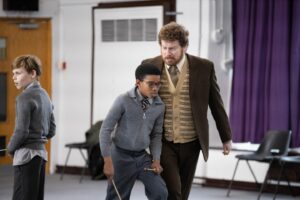
‘When did you become aware of racism, Delilah?’
“I hadn’t realised there was a colour bar until I left primary school.After that, I realised for the first time that there were people who just didn’t like coloured people. Didn’t know anything about us, but didn’t like us. I didn’t know I was poor and I didn’t know I was black: all I knew was that I was me.”
When I asked my students if they were alone in this contumely, that of the ‘Asians’ was raised. They were the first group singled out for attack in the north of the country.
‘Just who are Asians?’ I asked.
‘They’re from Pakistan.’
‘Yes, and from India, Afghanistan, Iran and lots of other countries.
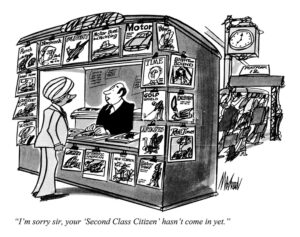
The term Asian is a construct of the Raj. Did you know there are no Asians in Asia, ’I said, ‘only people belonging to different nations and countries. They don’t see themselves as Asians but as citizens of various nations. They are Asians only in the West. To those who make things unpleasant for them ‘Paki’ means any Asian.’
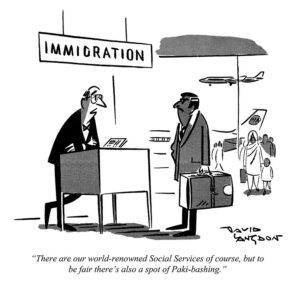
‘What about those Cork asians we hear about? The ones from Ireland.‘ Oi, Let’s have a few pints and go paki bashing, eh?’ mocked Delroy. ‘The skins harass them all the time, carry out mean petty crimes against them, keep them keyed-up.’
‘They’re a soft target,’ I said. ‘You know what I mean- based on your observations?
‘They’re generally slightly built, very compliant and law abiding, ’said Winston. ‘They will take a hiding without complaining. They’re very concerned for their security, concerned that if they leave the country they won’t be allowed back.’’
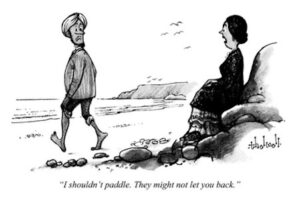
‘They stand out just like us’, said Delroy. I remember seeing sixteen people in the back of a Toyota piling out to sit on the grass verge of the motorway, eating pickles and samosas from tinfoil, the men speaking loudly in Punjabi, the women wearing saris picking flowers alongside the road.’
‘What kind of work do you see them doing?’
‘You only have to walk to the corner to see this. The little shops they run are thick on the ground. ‘
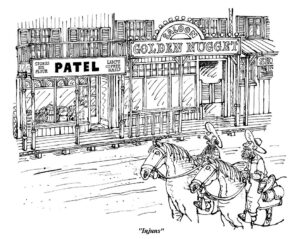
‘In this nation of shopkeepers, they have replaced the ranks of white small business people, no longer willing to stay open all hours. They are equally hard working at providing a good education for their children who move up into the middle class. Of course many are poor workers with few skills and suffer from low wages. In many ways they are cut off from mainstream society because of their strong attachment to their languages and religions.’
‘That sounds like skinheads themselves’, said Delbert.
That’s true, Delbert. Many come from broken homes where the father is absent. It’s a common thread in extreme-right wing extremists, looking for family and security. They blame modern society for the breakdown of the family. They have a shared sense of rejection. The National Front recruits and targets the vulnerable, the uneducated. inciting them to go out and commit hate crimes.
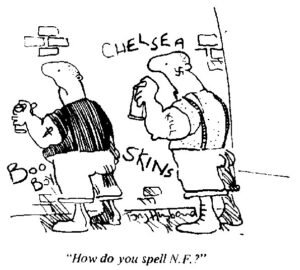
This open carrier of racist ideas in the inner cities supplies the tough, violent, but often fatherly male figures some young men are looking for. They’re looking for male role models-some to look up to . The main political parties don’t bother to get their hands soiled in areas where they live.
The far right gives them a safe environment. There are lots of drunken punch ups, but they flatter and elevate them. They take them into pubs while they are underage. They pick them up from home in a car, take them to clubs. They look for vulnerable young people outside of arcades or outside of punk rock concerts or skate parks, because they are banking on the fact that somebody there is going to feel marginalized, is going to have potholes that deviate their path, those things that appear in life, like trauma, abuse, poverty, mental illness that may alienate them from the rest of society. And then they promise them paradise. They treat them them as if they are bright. They teach them things. They bring them into a family. They give them an identity, and feed their sense of purpose.
Their proteges see themselves like knights of the round table waiting for King Arthur. While it is all misdirected, those the far right groom, being marginalized, disaffected and feeling abandoned, are willing to trade in their feeling of being the most powerless, for something that is savage and spiteful and that which they may eventually swallow whole.’
‘Such as?’
” How the Jews are evil, that they lie about the Holocaust. How blacks are inferior and criminally inclined. After theory-the practice. How to strike fear into people,” I said. “How to put the muscle on anyone who looks different-blacks, Asians anyone even remotely progressive, or with glasses or, worse still, a ponytail.’
’Cause The White Man Has A God Complex.
If Spartacus will stand up, then the rest of you will go free.’”
Olivier’s character in the eponymous film.
To explain how people from different races look different, I introduced the classes to the ideas of biological Darwinism: ‘People whose ancestors have been living in the same geographic area for a long time tend to show similarities in visible characteristics such as size and shape, skin colour, and hair form, and also invisible characteristics such as blood groups. So how do we explain how these change over time leading people to look different over time from their forebears and from other people in different places.
‘The theory of biological evolution developed by the English naturalist Charles Darwin and others state that all species of organisms arise and develop through the natural selection of small, inherited variations.
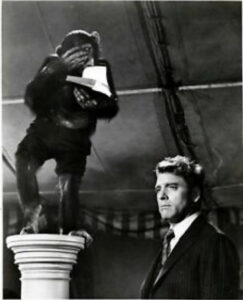
These increase the individual’s ability to compete, survive, and reproduce.

Over time they are exposed to a number of biological processes, and adapt slowly to local environments. The environment may favour certain characteristics, producing populations that are on the average taller, or darker, or more rugged than other populations from other geographic areas.
‘So how does that explain why my hair so coarse? Asked one boy.
‘It’s so that when you’re running through the bush in search of water buffaloes, your hair won’t get caught in thickets of brambles,’ answered another.
‘An imaginative guess,’ I said. Afro-textured hair may have initially evolved because of an adaptive need amongst humans’ early hominid ancestors for protection against the intense radiation of the sun in Africa. The relatively sparse density of such hair, combined with its elastic helix shape, results in a cooling effect.’
‘And does evolution explain why my legs are so long?’
The reason why your legs are so long is so that when you’re loping through the grasslands in pursuit of the wildebeest and the rhinoceros, you would run very fast and swiftly.’
That’s correct. Research shows blacks have proportionally longer forearms and legs than do whites.

That explains why more and more, the winning runners are black athletes. People living close to the equator tend to be drawn out long and thin – it increases the overall surface area from which to lose heat, while reducing the size of the upper surface -shoulders and top of head- that’s exposed to the direct overhead sun. Do you have any further questions?’ I asked.
‘Yes, sir, I want to know why in blazes I’m here in this overcast, concrete decked city.’
‘We’ll come to that very soon.’
I then explained how Darwin’s theory has been seized upon and misapplied by certain thinkers to justify their ideas rather than satisfy the requirements of science. They took up words and ideas which Darwin had used to describe the biological world, and they had adapted and corrupted them to their own ideas and theories about the human social world.
‘Social Darwinists believe in “survival of the fittest”—the idea that certain people become powerful in society because they are innately better. Social Darwinism has been used to justify imperialism, racism, eugenics and social inequality at various times over the past century and a half. It strengthened the belief that government should not interfere in the “survival of the fittest” by helping the poor. It promoted the idea that some races are biologically superior to others. It pervaded education policy so that in the white students in the US were treated preferentially to those of colour.
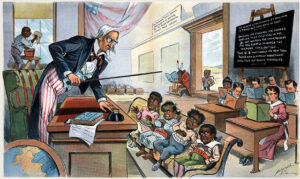
The explanation social Darwinists arrived at was that businessmen and others who were economically and socially successful were so because they were biologically and socially “naturally” the fittest. Conversely, they reasoned that the poor were “naturally” weak and unfit and it would be an error to allow the weak of the species to continue to breed. They believed that the dictum “survival of the fittest”, a term coined not by Charles Darwin but by sociologist Herbert Spencer, meant that only the fittest should survive.’
‘That doesn’t sound like it would have led anywhere good for those considered unfit.’
I then set out to explain the economic and social circumstances in which racism occurs.
I explained how over a long period of time many white people had bought into the myth that the Empire had validated their success in the social Darwinist struggle for survival and racial supremacy.
It led to such atrocities as slavery, the holocaust and sterilisation of women.’
‘ It seems to me’, said Delbert, ‘that we are here, in the UK, because they were there, in the countries of our origin. Enriching the mother country by making away with our resources at gunpoint through the sweat of our labour. And ravaging the land.’
‘Queimada! Burn, baby burn! ’cried Winston. ‘They set fire to the forests, the sugar-cane fields and the villages’.
‘You’ve seen the film, I take it, Winston?’
‘ We’ve all seen ‘Queimada? It’s showing along Portobello Road. My brother took me.’
‘ How did you find it?
‘Ah sey one,’said Alfred. It’s spectacular. The wild carnival makes ours at Portobello look like a tea party. There’s lots of action. Rip roaring, violent street fighting, riots in the villages, battles in the mountains.’
‘Is the violence gratuitous? ’I asked, making it clear they knew this would detract from the work. Is it there to entertain in some corrupt way?
‘Sir, I can assure you the fights in it are full on,’ said Delbert, a veteran football fan, ‘ They all fall down and you feel the pain in their guts.’
‘And how,’ I said. ‘The fights and assassinations and coups and burnings are never rendered gloriously, as triumphs of the spirit. They are always, no matter the circumstances or the author, dispiriting and make your stomach crawl.’
‘What’s it all about, Alfie?’ I asked, getting to the meaning of the narrative. What’s it got to offer you British lads and ladies?
‘It offers a quick history lesson on the white man’s exploitation of blacks. We’re smart enough to figure out what’s going on. It’s about a slave revolt on a Caribbean island and how it was put down. And how the people rise up again.’
‘Was this a real event, Mr. Davis? ’asked Delilah.
‘The story is loosely based on real events. As a point in fact the indigenous population was on some islands wiped out by colonists setting fire to the entire island and killing all and everyone on it. In Portuguese the name means Burn!’’
‘ Which is where our folks came in,’ said Delroy. By the rivers of Babylon, that’s when our forefathers were imported from Africa. With a fortitude of superhero proportions they survived the hulls and holds of slave ships across vast oceans, branded permanently as a molten iron does a young calf shackled, assaulted, abused, imprisoned, beaten, whipped, mutilated, all to clean up the mess and cut the newly planted sugar cane.’
‘As a result you can say modern Britain was built on sugar. It was like a narcotic drug. For three centuries the plantation’s slave-grown sugar satisfied the British craving for cakes, confections and sweetening their coffee and tea. There is hardly a manufacturing town on these shores that was not in some way connected to the “Africa trade”. Britain was the premier slave-trading nation. Before it got involved in it, Britain was a small country in the North Atlantic and didn’t have many resources. The trade enabled it to take off. The Royal African Company, the company founded to initially start enslaving Africans for the British Empire, enslaved more Africans than any company in the world. The glittering prosperity of slave ports such as Bristol and Liverpool was derived in large part from commerce with Africa. Slavery was the “flywheel” that drove the global development of everything from trade and insurance to technology, religion and medicine for nearly four centuries. Clank, clank, clank. How did this go down with those who produced the wealth? How did this go down with those who cut the cane?’
‘They had a craving for freedom’, said Delilah. ‘It drove them to rise up against their servitude.
In ‘Island in the Sun’, Harry Belafonte’s character, a union organizer, talked of a past uprising on the island of Santa Marta.’
‘What did he say sparked it off?
‘Harry said any number of reasons: ‘A single insult, a whipping, a girl. Who knows?’
‘Santa Marta is a fictional island,’ Delroy said . Were there really uprisings like this?’
‘There was a slave uprising in Haiti,’ I said. ‘and beyond the shadow of a doubt there was widespread harsh treatment . The main character character is loosely based on the American mercenary, William Walker, who was president of Nicaragua from 1856 to 1857.
‘ Isn’t Marlon Brando spiffing in the role of William Walker’’asked Delilah?’
‘Dat di best eva mek, mon. He’s a tasty geezer and no mistake’, said Mary.
‘How would you describe him, Delilah?’asked Delbert, ‘and what is he on about?’
‘He’s more than a dandy. He could charm a vulure off a corpse. But he’s also ruthless, cunning and conniving. He’s a real toff guy. He is sent to Queimada to plant subversive ideas in the heads of the of the black slaves. He is fomenting an uprising in the name of revolution. Walker makes his reconnaissance and writes the place off: The black natives are too whipped, knocked into a cocked hat, their Portuguese and mulatto masters too entrenched. But he meets a man in whom he sees the possibility of leadership. He selects a porter to be his revolutionary general because he’s willing to fight back against the ultra whites. Walker states that the black man must get his blood up about slavery on the sugar plantations before he can become free.’
‘When you say it like that he sounds very noble. An agent for democracy not feudalism.’
‘What’s the difference between these two,’asked Delroy ?’
‘In democracy your vote counts’, answered Delilah. ‘In feudalism your count votes.’
‘ Ten points to you, Delilah. Walker claims to promote democracy but has a hidden agenda. This natty rebel is an agent provocateur for the British. He plots also with the plantation owners to overthrow the government. His goal is to use the slave revolt to defeat Portugal, but to turn actual rule of the island over to the white planter class, which will then serve as a comprador class subservient to the British Empire.’
‘He talked to the owners about prostitutes and wives. What was that all about, Sir?’
‘In one of his speeches he compares the economics of having a wife to paying for a prostitute. He convinces them they would be better off paying low wages to freed slaves than having to house and care for the slaves for their entire lives. When they were freed money would come to facilitate-and some say corrupt- all transactions. Either way, the owners keep the whiphand handy when not in actual use.’
‘They’re racists too even though they’re mulattos themselves,’ said Delilah, one herself. They deny half of who they are.’ ‘I remember Walker’s conversation with a businessman regarding the slave revolt that Walker has secretly orchestrated. He says to Walker, “It’s very odd that black people have so much courage and ability.”
‘Well he had something coming, didn’t he, said Delroy. Never judge a book by it’s colour. Walker instructed this general and his followers how to use firearms and incited them to overthrow the Portuguese regime.’
‘Because of his lofty ideals?’ I questioned.
‘Hardly,’ said Delroy. ‘Britain wanted to open up trade with the island It was an important producer of sugar cane but nothing much else.
‘This was a monoculture dependent on the export of sugar as a cash crop to the world economy,’I explained. It was like oil today. Walker’s plan was for the slaves to throw off their chains and replace the Portuguese administration with a formally sovereign state controlled by the mulatto elite friendly to Great Britain.’
‘And they all lived happy after.’
‘Unfortunately no,’ replied Winston.‘ This is no glamorous period drama, although Marlon looks pretty fancy. Walker was playing the sides against each other. He tricked the slaves and their leader, Jose Dolores, into a revolution by arming them and then letting the Portuguese know where they.’
‘He had no ethics. You do know what ethics is, don’t you, Leroy.’
‘Of course I do. It’s a county to the south of London.’
‘Wrong. It’s about wrong and right but in a moral sense. He was setting up all two sides for a battle. This meant the slaves would be forced to fight to protect themselves. Then he convinced the victorious army of former slaves to lay down their arms after the Portuguese had been defeated. Walker’s deviousness got him what British interests wanted.’
‘ A neocolony dominated by the white planters, ’I said, but one in which the de facto rulers, in accordance with the laws of international free trade, are the British sugar companies. These British interests established a putrid puppet government which lasted until the end of slavery.’
‘Did the British ever pay reparations for what they did to our people?’
‘When they ended slavery in their colonies the British government paid the largest payment ever to the slave owners, and the enslaved got nothing .Though, slavery had formally ended and the former slaves in theory had rights, a legal and property system was established that forced them to continue to work in the sugar cane plantations in even worse conditions than before.’
‘They worked harder, and got little reward for their work. In the eyes of the plantation owners who made super profits off their backs , they were only shadows, to be feared or ignored.’
‘There must have been some good whites among the owners surely?’
‘The good whites had their day with ‘Gone with the Wind’. The owners got richer and England profited. Except there comes the hitch.
‘And what’s that?’
‘The leader who Walker acted on behalf of to put him into power as the head of the provincial white government favoring Britain is not received well by the general. Jose Dolores raises a rebel army against the British installed leader who has taken on a mind of his own. The guerrilla army sets the city on fire. The leader is forced to yield to the general and surrender his government peacefully.’
‘ So things were looking up.’
‘So it seems. Except there comes a snag. And you know what that is?’
‘ Sadly the general is uneducated and his black followers have difficulty running the country without the whites.’
‘This a common problem in the immediate transition from classic slavery’, I said. ‘You’re not going to have a handle on the economic complications inherent in running a country when you’ve never had to worry about this sort of stuff before. This is because you’ve just relied on those who exploit you. By denying people an education and training, they perpetuate backwardness. This perpetuates mental slavery.’
‘It sounds just like in Jamaica today’, said Delilah. ‘More black faces managing affairs but the same old problems remaining. A decade after independence people feel they have not been provided with what they expected. You can see this backwardness in ‘The Harder They Come.’You can hear it in the music. The sense of frustration and resistance. People like my parents were optimistic in the fifties. Then as the number of jobs dried up, they pulled a long face and left to come here. Its this same disappointment that tips Jimmy Cliffs character to crime.’
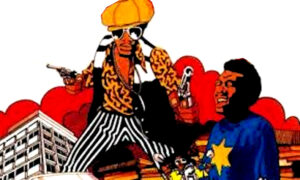
‘And his brutal treatment,’ said Delbert. The would be singer gets eight blows from the tamarind switch from captors as black as himself.’
‘It’s not just the land of beautiful beaches with luxurious resorts that we see in the glossy travel brochures,’ I said. ‘Jamaica’s always been a place run on violence and terror. You can see the legacy of this in ‘The Harder They Come.’’
‘We can put this brutality and backwardness down to slavery, ’said Delilah. ‘Racism was at the heart of empire. It was institutionalised by the ruling class. The West Indies are still colonial countries. The values of the plantation still prevail.’
‘Why is this so?’, asked Delroy ?’
Since colonial times, you’ve always had rule by a few. During slavery, it was by the sugar barons who settled in the Caribbean to acquire a king’s ransom and a social status they would have been denied at home. Always outnumbered greatly by the blacks, to control them the white planters relied on, humiliation, degradation and extreme violence.’
‘That short drop to a sudden stop.’
‘From their point of view the hangings were necessary. Alongside the repression, the history of Jamaica is one of constant revolts. Like on Queimada, there was always somewhere for slaves to run away to, unlike on the other smaller sugar islands.’
‘In Barbados, ’said Delbert, ‘its flat and full of cane. There’s nowhere to hide. Not that you need to these days. When my brothers hear the sound of police sirens, they know how white people feel. Relaxed, cause when they hear them, they know they’re not necessarily coming after them.’
‘Well as the centre of British power in the Caribbean its’ enforcers would have certainly chased after and retrieved their chattels back in the day. Barbados has a special place in the history of the British Empire. It was the first society in human history that was built totally on the basis of slavery—its economy, its social system, its ideas. ’
‘It was known as Little England.’ Said Delbert. ‘Black people were deliberately kept landless and subjected to an extremely deficient diet. Barbados probably has the highest incidence in the world of diabetes and hypertension.’’
‘We can see the imprint of those years of slavery in the health profile of the current population.’
‘The British systematically underdeveloped Barbados, Delbert let rip angrily. ‘They siphoned off it’s resources for generations.’
‘Have you spent much time there?’ I asked him.
‘I’ve flown to and from there several times. I’m fully conversant with their airport security procedures.’
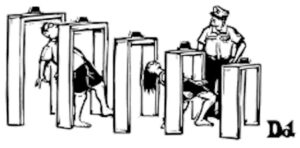
‘So you like travelling?’
My people have spent a lot of time travelling, whether they wanted to or not. Englishmen and others came to our ancestors in Africa and offered them a free trip to the West Indies, complimentary bracelets, a conga line to the ship, all expenses paid. You could decline the ‘ deal’ any time but you could never stop being trafficked around.’
‘In Jamaica you could go up to the mountains and join the bands of runaway slaves.’
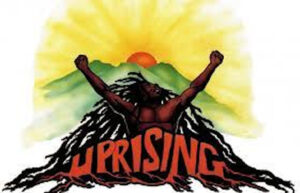
‘Now back to Walker. What happened to him and the revolution?’
‘He left the island after the revolution. He comes back to Queimada ten years later, this time to destroy the black political movement he had helped create. But Walker is no longer working for the British government. His paymaster is the Royal Sugar Company, authorized by Her Majesty’s government. It organizes its own army and rigs Queimada politics directly, including ordering the execution of one of its puppet presidents.
Walker advises the army to ruthlessly lay waste to key villages, but the guerilla campaign continues. After this, British troops land on the island, contributing artillery and crack infantry for fighting the rebels. Walker sees that mountain villages are the base of support for the rebels, so he evacuates and burns them to draw them out. He also burns the mountain forests and the sugar crops. The same tactics had been used by the Portuguese to stop an earlier slave uprising.’
‘It sounds like hell in a very small spot, ’said Delroy. ‘Apart from the type of crop, It sounds just like in Vietnam.’
‘The parallels to Vietnam speak for themselves ,’I said. ‘At one point, Walker has to engineer a coup to get a reluctant government out of office and install a more aggressive one, just as we did to rid ourselves of the Diems. He ultimately must call in combat troops from the homeland. Just as Walker turns the country orange as in flame, burning the jungle clear to capture or kill the guerrillas, we’ve added Agent Orange to the fix.’
I put it to the class: ‘Do you see a positive message from this narrative?’
‘ It advances the idea that the desire for freedom from company rule will always be a flame which burns in the human heart,’said Delilah.’ The captured leader of the uprising refuses to take advantage of Walker’s offer of escape, preferring to be executed and die as a martyr. Walker has come to admire Jose Dolores because he is everything Walker is not. In all his glory Walker is a mercenary and believes in nothing. He rules by force. Walker, though he’s British, pretty much encapsulates the trajectory of American history: he begins as a revolutionary and he ends as a counter-revolutionary.
‘How does he differ from Jose Dolores?’
‘Jose Dolores believes in his cause with all his being. Despite heartbreak and failed relationships, his followers fight for him out of love, respect and loyalty. Jose Dolores becomes a Christ-like figure at the end, full of fire and passion, inspiring others to follow his lead. Walker, despite his success, is a hollow, bitter, lonely man. Unable to understand the values and political conviction of the captured rebel leader, Walker asks him: ‘What kind of revenge is it if you’re dead , to which the leader replies, ‘If a man gives you freedom, it is not freedom. Freedom is something you take for yourself.’
‘How does a movie such as this help towards this end?’ asked Delroy.
‘It’s most powerful as argument: It speaks to the permanence of political revolution. It closes on a shot of the surly, bitter, seething people of Queimada, and in their anger it sees a forever of violence. ‘It’s like this, this is the way it will go,’ he seems to be saying, and it doesn’t seem that he got that one wrong, barring peace breaking out in the past five minutes. It’s brilliantly constructed to argue what might be called the classic imperial paradox: To win this war you must make inevitable the next. The corollary is that as long as there are empires, there will be wars.
‘You may or may not agree; that isn’t the point. The point is that this narrative is marshalled brilliantly and frequently to make it clear’.
Delilah remarked ‘These companies have a disproportionate lot of power. Wasn’t the government able to represent the interests of all their people, not just businessmen? The Buffalo Soldiers were able to.’ She proudly displayed the picture of one pasted on the cover of her workbook.
‘ Ladies and gentlemen, the world has long been increasingly controlled by companies rather than countries. The notion of a country such as Great Britain or France is becoming as irrelevant as ever. Today is the rule of the multinational company. As with the Buffalo Soldiers, as with today, at the end of the day in Quiemeda, everyone but the rebels are working for the company.
‘So the company gets it’s way.’
‘Not everything it wants. The British strategy in Queimada achieved its goal but also destroyed the reason for Britain’s interest in the island. The sugar company complained, wondering whether the price is worth paying. Walker explained it like this: “That is the logic of profit…. One builds to make money and to go on making it or to make more sometimes it is necessary to destroy.” This, he reminds his interlocutor, is how the island got its name. In Portuguese it means ‘Burn!’ Nature on the island has to be mashed up so that labour can be exploited on it for hundreds of additional years. But Walker reminds the company’s representative that even if Queimada is burnt to the ground, it would be worth it, because it would at least stop the revolution spreading to other islands where the company also has sugar interests. It would ensure the agents of Empire could continue to install whoever they wished to quell any uprising.’
‘Right now,’I said, ‘their post-colonial successors fear the tables being turned on them from both abroad and on their very doorstep. It seems to them that abroad Britain is being pushed around by every two-bit dictator playing to a domestic audience.’
‘Who do you have in mind, Sir?’
‘Idi Amin.
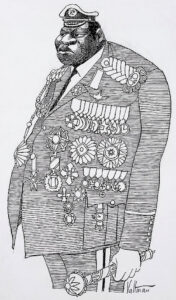
This year this Ugandan dictator has broken diplomatic ties with the UK. This British trained military man is doing things his own way, not the way he had been expected. He has nationalised eighty-five British-owned businesses. He has persecuted and expelled Ugandan Asians . You can see them on the news streaming into Heathrow.’
‘Carrying out his own bit of paki bashing.’
‘Most of them are of Indian descent-but for any thug, black or white, that’s a moot point’.
‘And for his victims- a boot point’, added Winston.
I summed up by explaining how people who are by nature apprehensive of strangers physically and culturally different can during times of prosperity accept an intake from other lands to contribute to the functioning of the economy. Such as when Jews from Eastern Europe were welcomed to the German capital. Such as in Colonial Africa to where the British transplanted Asian skilled clerks, professionals and small business people. Such as in postwar Britain with full employment and a labour shortage. West Indians with professional and commercial skills seeking a better life presented few problems individually.’
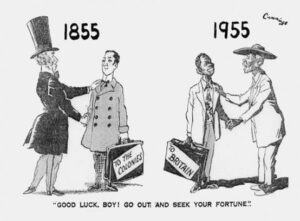
‘Why should they’, said Delbert. ’They put their shoulder to the wheel- for peanuts. Time tough! My dad was rushed off his feet as a cook until he had enough money to send for his wife and family. What was he thinking when he left Jamaica ? ‘Bloody blue skies all the time here. I want hail, sleet, snow and smog. All this calypso music! Where can a man hear some skiffle round here?
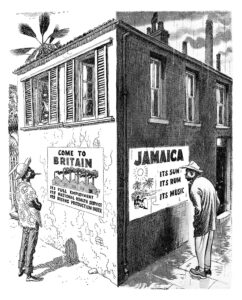
When he and his family were reunited here They had to share a crowded flat with that of his bus driver brother.’
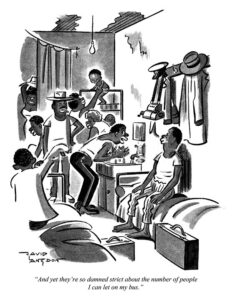
‘They were always scanning the papers for jobs.’

‘ Unfortunately the natives are apt to see problems with them as a group, to deflect blame onto them and others when things go wrong. They will allow greater discrimination in employment, trade unions and rental housing. How in times of economic strife people become way more jingoistic and isolationist, all the mostly irrational resentments that are under the surface coming out into the open. The fear that their neighbourhoods, their schools, their hospital beds and their jobs are being overrun. In the British case ignoring the fact that many West Indians were ex-servicemen, that Indians were too and kept the Yorkshire woollen mills going, that Pakistanis service Bradford, that all work in hospitals and restaurants. It’s in these areas of unskilled and manual labour-ones which white Britons had moved out of, areas hardest hit in the downturn, where problems arise. Then again, people of colour at all levels who keep their jobs arouse the envy of whites who haven’t.

People of colour at all levels who lose them arouse resentment if they’re on the dole. No sugar in the bowl.’
‘Whether you’re a poor ‘darky’ or a well off one, you just can’t please, said Winston.’
‘Governments have had to tread a fine line between honouring their obligations to their citizens from the former colonies and placating their constituencies.’
‘Which major party is worse at playing the race card? asked Winston.
‘ What do you reckon? asked Delbert? When I was little,’ ‘I remember hearing on the radio the slogan “If you want a nigger for a neighbour, vote Liberal or Labour”. Who does that leave?’
‘Generally the Conservatives, being the stronghold of the imperialist right,’ I said, ‘go for the strictest controls.
In theory Labour is more committed to the principle of equality and is down on discrimination. In practice it’s M. P.’s are more likely to represent constituencies with substantial populations. Hence it has a glass jaw when it comes to layers of white resentment. At one point of time, Labour tried to bring the former colonies around to adopting controls over travel. The Labour minister who was challenged in that slogan felt he could only reply by presenting his tough record on immigration. It didn’t save him. He lost his seat to the racist Tory. Such politicians woo the working class using divisive “wedge” issues that touch on social anxieties.

Immigration has become a tricky issue for governments of both sides. They never really appreciated the factors forcing people to emigrate or those bringing the long economic boom to and end.’
‘My dad told me’, said Delroy, ‘ they showed a film in the West Indies after the war showing the miseries of the English winter and the prospect of unemployment. It didn’t put him off however.’
‘British life has been complicated by the ethnic factor, but how complicated had the British made ethnic diversity for the rest of the world? They had encouraged large numbers of Indians to settle in the east African colonies. Placed under pressure, under the policy of Africanisation following independence, Britain was responsible for dealing with the exodus. The immigrants tended to congregate in specific areas drawn by the prospect of employment and cheap housing, making their presence all the greater.
‘Is racism new in modern England? asked Delbert.
‘ The roots of racism before the War lay in antagonism to the Irish and Jews. They were seen widely as inferior races. They were subject to the same kind of stereotyping that was directed at colonial peoples. For example ‘Punch’ cartoons in the 19th century depicted the Irish in terms very similar to those used in America to depict black people. Giving them simian features to convey that they were barely above the apes in development. As with black people today the reality was that they were rarely the root of the problem. It’s always easier to point the finger at the outsider. That’s where groups like the Front come in..’
‘When did it start? I was asked.
‘ It’s the latest of a line of racist groups. Before the War it was Jews and Irish who were the butt of their attacks. Since there is little political capital left from blitzing the jews anymore, it turned it’s hostility on immigration to mobilize support. New members flowed in following the expulsion of Indian Ugandans. While they have achieved limited success electorally, they see their main strength in strong-arm tactics. They have marched through immigrant neighbours seeking to intimidate and to provoke attacks from immigrant youth and socialist groups.
‘What can we do to drive them off ?’ asked Winston?
‘To top it all off for them , we could move in next door to them’, was one novel suggestion. ‘That’ll bring down their property value.’
‘Seriously, we need to deal with the issues on which they thrive: identity, alienation, the emasculation of the white working class, job insecurity. Politicians should not denigrate immigrants, tighten borders, or curtail government spending on housing and welfare. The retreat of government creates an opening for racists. At the same time a very broadly based campaign must be built to bring their growth to a standstill,’ I said. ‘To pare their numbers to a violent core who will be reduced hopefully to fighting each other.
Eventually the Deputy Principal tapped me on the shoulder and called me into his office.
I knew straight away what he wanted to say. I said ‘I know who we’re up against here. I don’t want to draw their nasty response to the school.’
He asked me to cool it: ‘Be careful. Heed the spark or you may dread the fire.’
‘Consider it done’, I replied. ‘I don’t want this to become a safety issue for the school.’ I had no problem complying with this kibosh. He spoke like a true gentleman and I was grateful for having been able to get away with what I had.